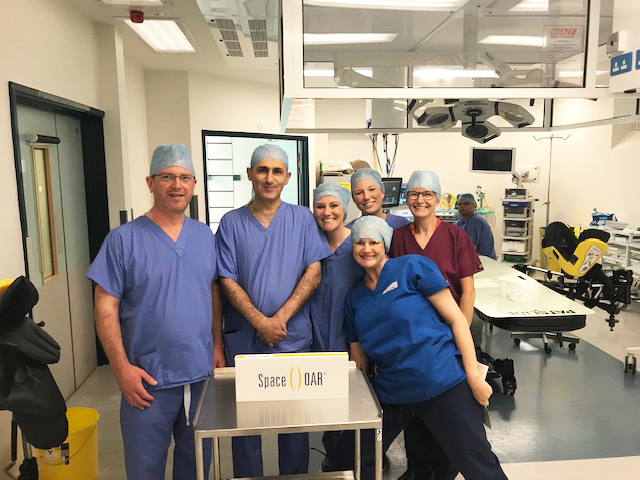
Pictured: Consultant Urologists Mr Iain Campbell and Mr Mohammad Masaarane with Theatre Practitioners Nicola Burnley (front), Clare Matthews and Tracy Gowerson following the first SpaceOAR operation
Surgeons at East Lancashire Hospitals NHS Trust (ELHT) are the first in the North West to use a hi-tech innovation which has major benefits for patients receiving radiotherapy treatment for prostate cancer.
Known as SpaceOAR (Organ At Risk), the new technology is a hydrogel which creates space between the rectum and the prostate, making it much less likely that the rectum is exposed to radiation.
Made mostly of water, SpaceOAR is injected before treatment starts and then remains in place during radiation therapy, before being naturally absorbed by the body after about six months.
Consultant Urologists Mr Mohammad Masaarane and Mr Iain Campbell, assisted by theatre practitioners Nicola Burnley, Clare Matthews and Tracy Gowerson, performed the region’s first SpaceOAR hydrogel insertion in a 62-year-old patient during 30 minutes procedure at Burnley General.
Mr Mohammad Masaarane, said: “This is fantastic news for prostate cancer patients, who now have the opportunity to undergo radiation treatment while minimising potential side effects. The Hydrogel Spacer is clinically proven to lower radiation exposure to the surrounding organs and tissues.
East Lancashire Hospitals is one of only 10 hospitals nationwide chosen to pioneer the SpaceOAR technology for patients with prostate cancer.
Able to reduce the side-effects of radiotherapy for prostate cancer patients by over 70 per cent, SpaceOAR is part of the NHS Long Term Plan to put cutting-edge treatments at the heart of people’s care.
“New technology such as SpaceOAR hydrogel are important, they give men the confidence that not only are we doing our best to treat the cancer, but also that we are protecting their long-term quality of life from bowel, urinary and erectile dysfunction,” explained ELHT Clinical Director for Urology, Mr Iain Campbell.


